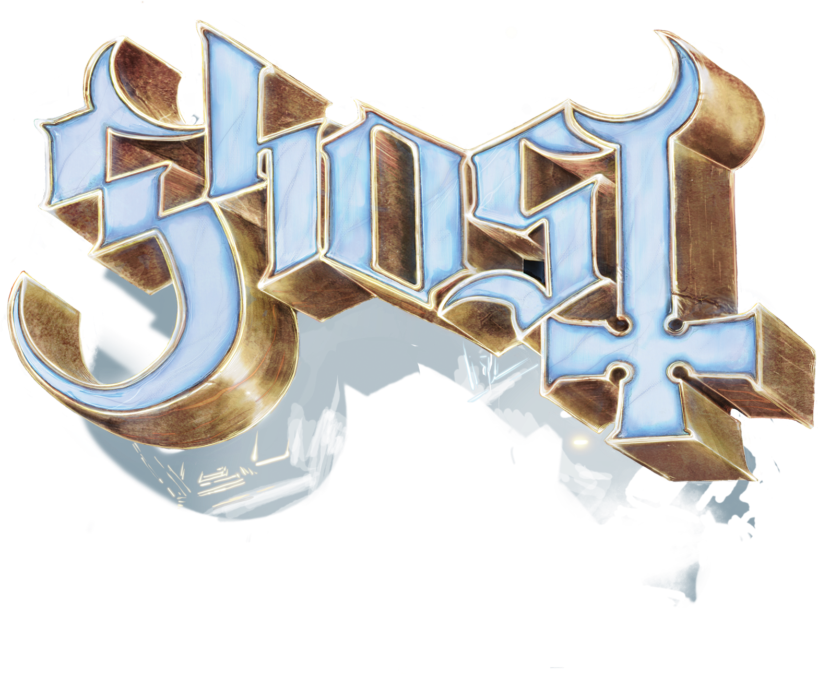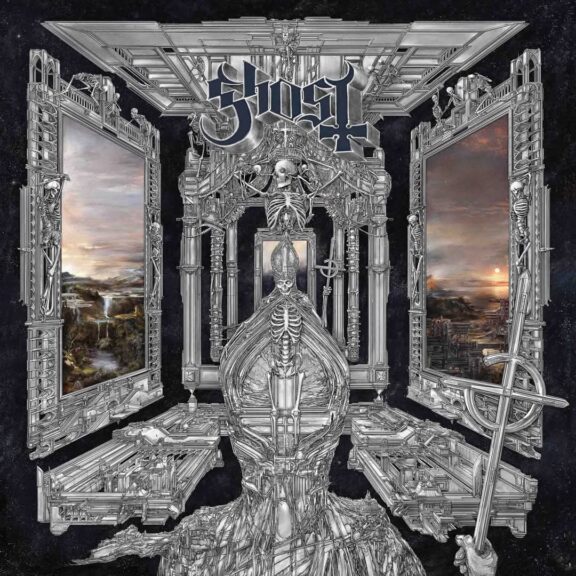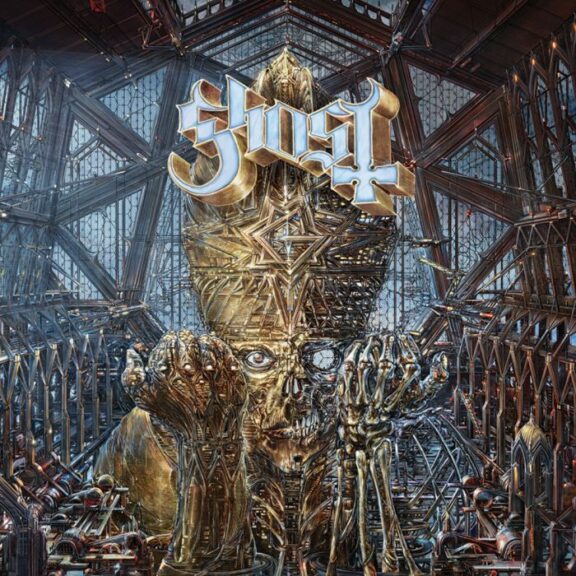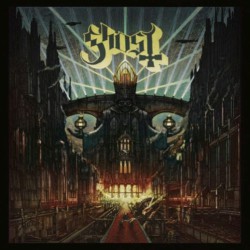Ghost (Tobias Forge) interview

Interview by Davide Sciaky
Puoi leggere l’intervista in italiano qui.

Hi Tobias, how are you doing?
Good, good, I’m glad to be out on tour.
It was about time, two years, a long time.
Yeah, for us every day, when there’s a show, it feels like a win because it’s very shaky. Especially here in Europe, it’s very shaky, everything, you can tell that a lot of people who come to the show they are happy to come to the show, but it’s hard to get people to come.
People are very… it depends on where you are, the farther away you are from the war, it feels like, the better it is. So, in England it’s quite good, Holland quite good, France quite good, and then you go in the inland and [there are the] sceptics, you know, I guess that people here who are closer to the war people are a bit more pragmatic when it comes to everything.
Recently you’ve released “Impera”, your new album, which focuses on “the rise and fall of empires”, a concept that you came up with after reading a book called “The Rule of Empires” in 2013. This kind of timeline is definitely something uncommon, coming up with a theme almost ten years before the actual album is released. Did you just shelf the idea for some generic future use, or did you have already at that time this very precise plan, “This is gonna be the next album, this is gonna be the following one, so this idea will be good for three albums from now”?
No, your work can change later depending on circumstances. There are ideas, I have a lot of ideas for the future that I know I can’t execute because always, when I get ideas, it’s never easy, it’s always harder and bigger and more ambitious.
I just knew at that time, and it was even before “Meliora”, but I think I was already working on “Meliora” at that time, so I already knew what “Meliora” was gonna be, I already had a concept of that, and then I had a concept for a plague records, it was just called “the plague record”, but that had a distinctive theme that was about the small human being subjected to God’s wrath in form of an annihilation, the threat of annihilation so, it was more biblical, in a way.
Whereas what actually happened in 2013: I was on tour, I was in Seattle at a bookstore near the venue and I saw this title, “The Rule of Empires”, that’s where I got the idea. I did buy the book, but I didn’t read it at the time, so the idea for the concept wasn’t necessarily from reading the book, it was just [from] seeing the title. Knowing that I wanted to make this plague record – small person, God’s wrath – empire was gonna be very different because empire was gonna be more like about a more structural demise, more a system falling apart, it was gonna shine a light onto the components of the system that is actively seeking to destroying. So, it felt like two different concepts: the plague record was about this one person, and the other one was more about the mechanisms.
So, that’s like, loosely the themes.
I think you have shown again and again over the years, and this album is no exception, your talent for writing catchy songs, earworms, so a song really stands out in “Impera” because it goes in a completely different direction being quite peculiar, and that is “Twenties”. I heard someone saying, “Tobias showed with this song that he’s in a place where he can do whatever the fuck he wants”. Do you agree with that, do you feel like today you have the freedom to stray away more from what could be considered the more classic Ghost characteristic for a song?
Yes and no.
I felt, ever since I made “Infestissumam”, that I enjoyed the freedom of being able to put almost whatever I feel like into a record. But it’s not without a certain degree of angst to do it because you’re always afraid that… you don’t want to lose momentum, you don’t want to make a bad record, you don’t want to screw up your work. Sometimes I feel that having loose leashes like that is both a blessing and a curse because it means that I can, every time I make a record, I can throw in something that feels like, “That’s a strange thing”, whereas if you’re in AC/DC you’re job is just to create ten more songs in the same BPM, basically. I know that’s not the case, I love AC/DC, but it’s just to say that it’s definitely more formulated, they have a go-to way where you can make it sound like AC/DC and people sort of accept it, whereas with Ghost’s five records with so many different elements, with so many different compartments, it’s definitely a little bit more unclear exactly what I’m doing, and sometimes even I get confused by it.
Not by a song like “Twenties” that felt… the thing is what people don’t really realise, even the weird songs like that, they are written, my idea is very spontaneous, it’s very intuitive.
I just knew that I wanted to have a song like [taps the song’s tempo] I wanted to have that, and I wanted to have like a Slayer guitar in there [mimics heavy guitar sounds] and I wanted to have a call and response. That was an idea that I’ve had for a long time, and then it was just a matter of putting it together. Once I started working on it, it was clear like, “Okay, this is not gonna be a melodic song, it’s gonna be more like a live song”, I think it’s gonna be better live than it is on the record. That is kinda uncommon for Ghost’s songs, but in my weaker moments making the record it was like, “It’s kinda like “Mummy Dust” was for “Meliora”, this is gonna be sort of the “Mummy Dust” of this record”, so I think it’s gonna be fine.
But then, you know, you remind yourself, “Don’t think too much, just do!”, but when you’re working with something all the time, of course you have moments when you think… [laughs].
Of course, it’s not like a jam, there’s a lot of time between when you write, and record, and release a song, so you have time to second guess yourself.
Of course.
I think something very interesting about you and Ghost is that, despite your background with the extreme Metal bands you played in before Ghost, and despite Metal’s general attitude of hating on mainstream music, and considering mainstream almost like an insult, you didn’t shy away from working together with different producers who came from a more mainstream background and who worked with people like Madonna, Lady Gaga and Avicii. Are these collaborations your idea, or was it suggested to you by others? And were you ever worried that your fans might react badly because of that, did the thought of people hating on you because of that ever cross your mind?
Crossed my mind, yes. Worry? I don’t think they would have liked me more if I didn’t.
There’s a lot of people that you lose in the moment… if you make a record, the moment you start doing anything to advance you career, you will always start losing people.
Look, I come from a very Metal background, I grew up in that kind of environment, I know what it’s like to be the outcast in this little group, and to like shit that no one else likes, so any sort of penetration from the outside world into our little group, we will find that offensive and as a defence we either push the threat out, or we push out whatever it is, we try to push out anyone who doesn’t want to be there, we push it out.
So, I have no problem understanding that, but the way that I work, and the way that I already set out 12 years now with this band, I cannot think about what these people back on the shore are thinking about me, because some of these people have criticised me ever since we did our first show, and they keep on criticising, and I just see that as, “Well, the more you talk, the better”.
But that’s not my problem.
The other question you asked, whose initiative was it: originally, what happened [is that with] the first two records – with the exception of one song where it was Martin [Persner] who came with the embryo of a song and then I wrote the lyrics, and I wrote a lot to turn it into a real song that would sound like a Ghost song – except for that I wrote the first two records and when I started writing the third record, “Meliora”, I had a few songs that were completely ready, like “He Is”, “Majesty”, “Spirit”, there were a few songs that were already in demos that you could listen to. Klas [Åhlund], who was asked to be the producer, he was like, “I just want to know before I take this job, have you already written everything? Is all done?”, and I was like “No, I mean, usually what happens is that I write ideas: I have an idea here and I have an idea here, and if I just play those two, you’ll just hear them as two snippets. I know in my head that that is gonna be a song but, of course, if I take these out and you’re in the room, if you’re constructive, you’re the producer and we decide that we are gonna have this love child together, of course we can make it work together”.
This was new to me at the time, because I’ve always been told by every other person that I’ve worked with before in bands that I was a dictator and I didn’t listen to anyone. Well, that was because I wasn’t, you know… as a girl at the dance: just because she doesn’t want to kiss you it doesn’t mean that she’s a bitch. It doesn’t mean that she’s a witch, and she’s not evil. Maybe she wants to kiss someone else. Sorry!
But that’s the thing when you’re writing music as well. Just because we’re in the same rehearsal room, and we play in the same band, doesn’t mean that I’m obligated to listen to your ideas, I can listen, I can be nice, but if I don’t take your idea, it doesn’t mean that I’m… it’s part of every band.
So, I was always told that I was this dictator, and I had sort of accepted that, until I met Klas because he proved to me that I can work really well with someone, just as long as that person comes with real ideas, and real criticisms, and he really tries, because he was always like, “I think that that bit and that bit are really good, this other bit that you are suggesting it doesn’t do it for me. Can you do something that is better? Come up with something better, I want to hear you do something that will make me smile”, so he got me to write better.
And when I had made “Meliora” he had sort of built me up as a songwriter, [I got] so much better. I felt, for “Prequelle”, what I wanted to try out was to work with some other people that you didn’t have to work with on a whole album, and to see how that worked.
That’s how I started doing that, to compare it to martial arts: it’s like you’ve been trained by the same sensei for years, and years, and years in shobukan karate, and then all of a sudden, when you’re like third dan you’re just like, “I think I’m gonna try ju-jitsu for a while, I’m gonna go try Kyokushinkai, and just learn new techniques to be a better fighter”. Because if you fight with the same people in the same dojo all the time, everybody is trained by the same dude, you know, you need to learn new things.
So, that’s why I started working with all these different people, that sort of keeps on sparring me into being a better and more aware songwriter.
That’s what I like, and if people back at the shore [don’t like it], well, okay, sorry [laughs]. It is what it is. It doesn’t make me like Necrophagia less.
The costumes and all the imagery have always been a very important part of Ghost. The other days I was watching some videos on YouTube of you playing with Repugnant some years back and I thought that it’s quite the change to move from wearing a sleeveless shirt and playing a guitar, to having a big costume, a mask, sometimes a stuff and so on. Do you ever miss the freedom of your previous bands, of being able to just jump on stage like you are dressed now, and do you think Ghost, like it happened with Kiss, might have a more stripped down, even unmasked, period?
No, we will not. It will not be stripped down.
It will change as we go along, there are aspect that might… I wouldn’t say simplify, because I think that a large part of Ghost is the theatrical bit, that’s what gets me going as well.
I know that we would never have gotten here if it was just for the theatre though, you need the songs, you can’t just be a theatre thing, you need the songs, but I know that they work in tandem.
And I will never forget that, I don’t think that a completely Pearl Jam sort of presentation, I don’t think people would enjoy that, it wouldn’t be the same thing with the big empty stage and just a drumkit. So, I would never want to try that, I don’t like that at all.
As a person, I do [miss it] sometimes, just because everything that we’re doing with Ghost is so complicated, everything, we can’t do anything like a normal band. Because we all live on so many places on the planet, just in order to get us in the same spot in the world to be able to play one note together, in costume, we’re talking about 100.000€, easily. That’s the starting cost just to get us in the same place. Everything is so difficult when it comes to that, it’s a good problem, but I’m just saying that as someone who loves to play music in general, I definitely long to, at some point in my life, again, not being the singer, not being the frontperson in a hugely dramatic, theatrical band. I would love to play drums, or bass, or just guitar in just a pure Punk Rock band and just go out and do that, because it’s a nice change from this.
But this is what I do, this is what I want to do, and this is out of all my project, out of all the bands I’ve ever had, this is by far the most fun, and the thing that I feel most intuitively lawless when within.
When I was 20 years old I really wanted Repugnant to be a big band. It wasn’t like we wanted, I never wanted Repugnant to be this small underground band. We have enjoyed like a posthumous sort of rectifying reputation, like a cult status, now. That’s not what I wanted. I wanted to be signed by Roadrunner. I wanted to release records. I wanted to be on tour. I wanted to support Slayer. I wanted to be a big band. If I had the chance, at that point, I would have done it and Repugnant would have become something else. It’s impossible for me to say what it would have become, but that was definitely what I wanted, but we were so off in ’98, ’99, the thing that we did was so unmodern that no one wanted to touch us.
Ghost managed to create a very solid fanbase very quickly, and from there to also become successful and to play bigger and bigger venues in a matter of very few years. I remember the first time you came here in Italy to play, in 2013, and there were people already with Ghost tattoos and I thought, “Wow, these guys have been around for such a short time, and people are already this dedicated!”. Do you remember a moment when you realised what Ghost was becoming, and that the band was here to stay?
There were several moments in the first year when a lot happened.
A ground-breaking moment was when Ferniz wrote about us. It was a ground-breaking moment when Duff McKagan wrote something on ESPN News, or something like that, he had a music column.
I think that the biggest shockwave was, Metallica was playing in Sweden and we weren’t there, we were playing at the Roskilde festival in Denmark and then we flew home. Because it was a huge show in Sweden, they were broadcasting the show on TV. Just before they played James Hetfield did an interview with a TV team, directly on Swedish television, and he was wearing a Ghost t-shirt.
I think that’s when in Sweden we went from a relatively unknown band, to something that most people, at least if you were interested in music, you knew that there was band called Ghost.
I’d say thanks to James Hetfield and Lars, and things that Phil Anselmo has done, Duff McKagan, Fenriz of course, and a few others of that sort of calibre, they were the ones that really pushed.
And, also, to whatever extent I’ve come to know a lot of them and [they are] very mentoring, which is crazy because one of the main factors because I was interested in touring was because of Iron Maiden and Metallica, sitting and reading all the lists of where they played, like in “Live After Death” they have schedules, rigging calls, lists of shit, and then to get to know Steve Harris, to be on tour with them, learning… many of these bands mentored me from a distance just by inspiring me, and then got to be my mentors in real life, which is unbelievable.
If I would call my 11 years old self [laughs].
He would never believe this.
No, it would be crazy!
Even my 21 years old self would be mind-blown.
“10 years from now James Hetfield is gonna wear your band’s t-shirt”, that’s insane.
Yeah, yeah, yeah!


![Phantomime [EP]](https://www.truemetal.it/wp-content/uploads/2023/05/1129543-576x576.jpg)



